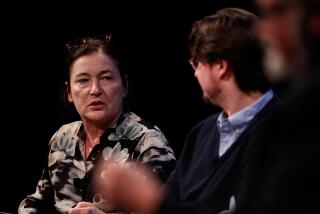She Walked in Beauty : VITTORIA <i> By Robert Merle (Harcourt Brace Jovanovich: $19.95; 374 pp.) </i>
- Share via
Vittoria Accoramboni was called the most beautiful woman in Italy when she was 15. Her fabulous fair hair swept to the floor, and when it was washed each Tuesday and Saturday and spread on a rack in the sun to dry, townspeople and tourists lined up to get a look at her.
The story of her life and tragedy in 16th-Century Rome is reminiscent of a tale written more than 300 years before she was born, Dante’s account in the “The Inferno” of the doomed lovers Francesca and Paolo, whose illicit love followed Francesca’s unhappy, arranged marriage.
Like Francesca, Vittoria was a historical character who inspired more than one writer. French novelist Robert Merle, a former winner of the Prix Goncourt literary prize, writes in his preface that he had been interested in Vittoria for 40 years, and he was particularly taken by her story as told in Stendhal’s “ Chroniques italiennes ,” which is a translation of an older chronicle. In our day, Vittoria would be a star, Merle writes, “and the worst that would happen to her, though pathetic enough, would be that she would lose her admirers as she grew old.”
But in her turbulent and misogynous world, such beauty was dangerous. Vittoria was intelligent, kind and unusually well educated for a woman of her time, having been taught to read the classics in Latin by a priest. But what the men in her life saw was a face and form too lovely to be at liberty. She was married off for convenience, secluded by her husband and even imprisoned at one point to protect her virtue; her happiness with the one man she loved attracted the cruel machinations of other men; all of her life was shaped by the relentless desire of men of various motives.
Merle tells Vittoria’s story through the first-person voices of some 20 “witnesses” who range from the brilliant Cardinal Montalto, who became Pope Sixtus V, to Vittoria’s maid, who divides her time between blithe carnal sin and the confessional.
The author might have taken a bit more care with character. The assortment of witnesses from all walks of life seems oddly undifferentiated as to sensibility and style of speaking. Perhaps this results from giving voice to Renaissance Italians in 20th-Century French and then translating it into English. One wouldn’t bother, except that this is a novel of serious intent and some accomplishment; it is annoying to read the words of an illiterate criminal reared in a fisherman’s hovel who seems to think and speak in the same style as learned theologians and the wealthy nobility.
Merle surrounds Vittoria with a rich variety of people and period detail. A highlight is an entertaining description of that highly secret ritual, the cardinals in conclave to elect a new Pope. Says one cardinal as the group goes into seclusion in the Vatican to choose the head of Christendom and Christ’s authority on Earth: “It was rather amusing to leave our splendid palaces behind and become cloistered in modest cells. It made us feel young again.”
There is a chapter told by the leader of Rome’s Jewish ghetto, where decades of oppression were lifted during this period by Sixtus V. Catholic theologians concern themselves with whether angels have material being. A Vatican detective conducts a sophisticated murder investigation. A great prince dies of gangrene, treated by doctors who say the disease is called lupa , Latin for female wolf, and is cured by putting meat on the wound for the wolf to devour.
Merle’s broad evocation of her world serves the story of Vittoria, a woman who could not elude male attention in an era as brutal as it was cultivated. Merle says in his preface that he wanted to tell her story “fairly and with compassion.” He has done more. He has revived a long-forgotten person who is worth remembering.
More to Read
Sign up for our Book Club newsletter
Get the latest news, events and more from the Los Angeles Times Book Club, and help us get L.A. reading and talking.
You may occasionally receive promotional content from the Los Angeles Times.









